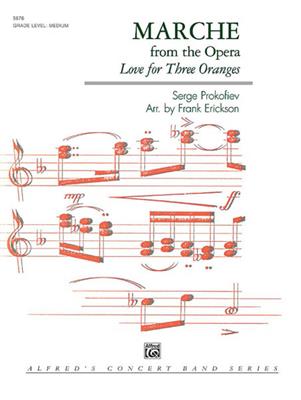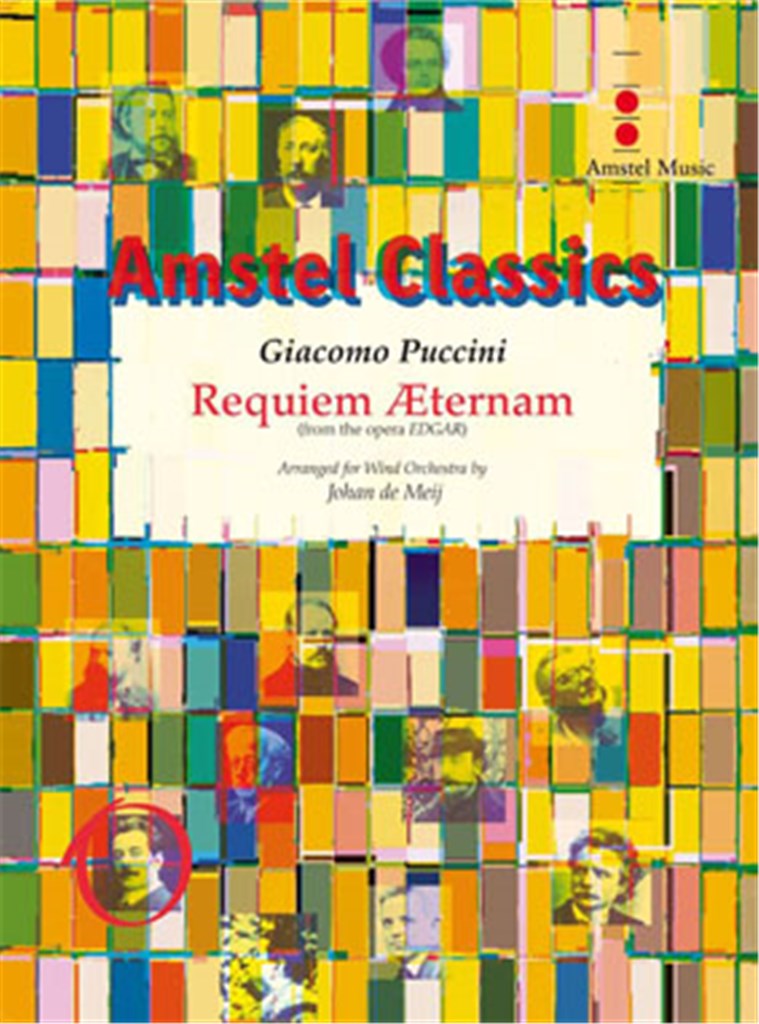Results
-
 £104.99
£104.99 -
 £64.95
£64.95 -
 £57.50
£57.50The Phantom of the Opera (Main Theme) - Andrew Lloyd Webber
Master Level - Grade 2 (Book 2, page 32). From one of the most successful Broadway musicals of all time, here is a powerful arrangement of the main theme. From the unmistakable opening strain to the low brass melody, and from the modulation of the final chorus to the haunting ending chords, this will become a highlight of any band concert. (2:15)
Estimated dispatch 7-14 working days
-
 £57.50
£57.50Phantom of the Opera (Main Theme) - Andrew Lloyd Webber
Nowak - Grade 3
Estimated dispatch 7-14 working days
-
 £55.20
£55.20Ouverture To The Opera 'Halka' - Stanis?aw Moniuszko
Estimated dispatch 7-14 working days
-
 £68.00
£68.00Requiem Aeternam (from Edgar) (Concert Band - Score and Parts) - Puccini, Giacomo - De Meij, Johan
Giacomo Puccini was commissioned to write a second opera after the resounding success of his first, Le Villi. However, the original four-act, grand opera Edgar, to a libretto by Ferdinando Fontana, received a rather lukewarm reception at its premiere in La Scala in Milan in 1889. Initially, the work was only performed three times. Of all the planned performances in the subsequent two years, only one took place, in Lucca, Puccini's birthplace. There, the work was well received. Nevertheless, the composer decided to make drastic changes to Edgar the most radical being the reduction of the opera to three acts, as well as altering a few arias, characters and instrumental parts. In its revised form, the work was even less popular than before. The discarded fourth act later provided material for Tosca (the duet Amoro sol' per te), but Puccini never felt the need to defend Edgar as he did other less fortunate operas, such as La Rondine and Suor Angelica. On a piano excerpt for his female friend Sybil Seligman he even corrupted the title to 'E Dio ti Guarda da quest' opera' (may God preserve you from this opera). This did not prevent Arturo Toscanini performing the Requiem from the third act at Puccini's funeral in Milan Cathedral on 3 December 1924. The Requiem in the third act is being played when the long funeral procession carries the alleged body of Edgar, the confused young man hesitating between the love of the virtuous Fidelia and the exotic Tigrana. The mass hails Edgar as a hero, but a monk claims that he has betrayed his country for a few gold pieces. When the soldiers try to desecrate the body, they discover that the armor contains none. The monk reveals himself as Edgar. He wants to leave with his faithful Fidelia, but the vengeful Tigrana stabs him and kills Fidelia. Edgar grieves over the lifeless body of his beloved, while Tigrana is arrested and the people submerge into prayer. Duration: 3.30
Estimated dispatch 7-14 working days
-
 £104.99
£104.99Ballabili (Concert Band - Score and Parts) - Verdi, Giuseppe - Van der Beek, Wil
Giuseppe Verdi's opera Macbeth was written in 1846/47 and premiered in Florence. It is based on Shakespeare's Macbeth and, unlike Verdi's other operas, had relatively little broad impact. This may be due to the difficulty of the singing voices, the lack of a love story or the dark mood, without humorous scenes.Musically, however, this opera is not uninteresting. Among other things, all the dramatic highlights culminate in artistically built ensembles. It also contains interesting instrumental effects, such as a wind orchestra under the stage in the witch scenes. This makes the witches and air spirits seem like from another world. In the 19th century opera, such a wind band, a so-called "banda" was not uncommon but an integral part of the scene.The Ballabili comes from Act III of Verdi's opera MacBeth. Ballabili is the plural of the Italian ballabile, meaning "danceable." It can also mean a dance performed by the corps de ballet, or by the chorus in an opera; or the music to accompany this dance.Duration: 2:15
Estimated dispatch 7-14 working days
-
 £68.99
£68.99Requiem Aeternam - Giacomo Puccini
Giacomo Puccini was commissioned to write a second opera after the resounding success of his first, Le Villi. However, the original four-act, grand opera Edgar, to a libretto by Ferdinando Fontana, received a rather lukewarm reception at its premire in La Scala in Milan in 1889 - initially, the work was only performed three times. Of all the planned performances in the subsequent two years, only one took place, in Lucca, Puccini's birthplace. There, the work was well received. Nevertheless, the composer decided to make drastic changes to Edgar the most radical being the reduction of the opera to three acts, as well as altering a few arias, charactersand instrumental parts. In its revised form, the work was even less popular than before. The discarded fourth act later provided material for Tosca (the duet Amoro sol' per te), but Puccini never felt the need to defend Edgar - as he did other less fortunate operas, such as La Rondine and Suor Angelica. On a piano excerpt for his female friend Sybil Seligman he even corrupted the title to 'E Dio ti GuARda da quest' opera' (may God preserve you from this opera). This did not prevent Arturo Toscanini performing the Requiem from the third act at Puccini's funeral in Milan Cathedral on 3 December 1924. The Requiem in the third act is being played when the long funeral procession carries the alleged body of Edgar - the confusedyoung man hesitating between the love of the virtuous Fidelia and the exotic Tigrana. The mass hails Edgar as a hero, but a monk claims that he has betrayed his country for a few gold pieces. When the soldiers try to desecrate the body, they discover that the armor contains none. The monk reveals himself as Edgar. He wants to leave with his faithful Fidelia, but the vengeful Tigrana stabs him and kills Fidelia. Edgar grieves over the lifeless body of his beloved, while Tigrana is arrested and the people submerge into prayer.
Estimated dispatch 7-14 working days
-
 £104.99
£104.99Prelude and Polonaise - Nikolai Rimsky-Korsakov
Nikolai Rimsky-Korsakov (1844-1908) composed his opera The Night before Christmas in 1894-95. The premiere took place on December 10 1895 in St. Petersburg. The libretto to the opera came from Rimsky-Korsakov himself and is based on a tale by Nikolai Gogol, which some years earlier had already served as operatic material for Pjotr Tchaikovsky. The opera tells the story of Vakula, the blacksmith of a small Ukranian village. He is madly in love with Oxana who demands - as proof of his love - a most unusual Christmas present: the magnificent slippers of the Empress. Knowing full well that, in normal circumstances, he would never be able to fulfil Oxana's wish, Vakula seekssupernatural assistance and finds it in the shape of the devil, who comes up with a ploy to help him. The devil carries him on his back to St. Petersburg, where during a lavish reception at court Vakula finds an opportunity to present his request to the empress. The Empress actually agrees to Vakula's wish and hands over her slippers to him. Thereupon he returns to his own village. Here, in the meantime, he had been given up for dead, and Oxana had been plunged into great sorrow as she had come to realise that she also truly loved Vakula. In the end, however, all misunderstandings are resolved and all adversities overcome: Oxana receives her extravagant present, the lovers are united, and the church bells call the villagers to the Christmas service.The vibrant Polonaise is played in the 3rd act of the opera at the entrance of the Empress, whose appearance is anticipated in the prelude by the fanfare motives. The music paints a vivid picture of the party atmosphere and the marvellous dcor at the imperial court of St. Petersburg, which Rimsky-Korsakov conjures up in his opera and which can also be played outside of the Advent and Christmas season, for example as an opening piece to any festive concert.
Estimated dispatch 7-14 working days
-
£94.99
Soldiers' Chorus (Concert Band - Score and Parts)
The tale of Faust, who sold his soul to the devil in exchange for knowledge and power, has been a source of inspiration for many authors, poets, film directors and composers. Among these is the French composer Charles Gounod whose opera Faust was first performed in 1859. This charming Soldiers' Chorus is one of the most famous melodies from the opera. Its musical simplicity and beauty fits any concert programme that needs a well-known classical arrangement. The tale of Faust, who sold his soul to the devil in exchange for knowledge and power, has been a source of inspiration for many authors, poets, film directors and composers. Among these is the French composer Charles Gounod whose opera Faust was first performed in 1859. This charming Soldiers' Chorus is one of the most famous melodies from the opera. Its musical simplicity and beauty fits any concert programme that needs a well-known classical arrangement. 0:03:11
Estimated dispatch 7-14 working days
